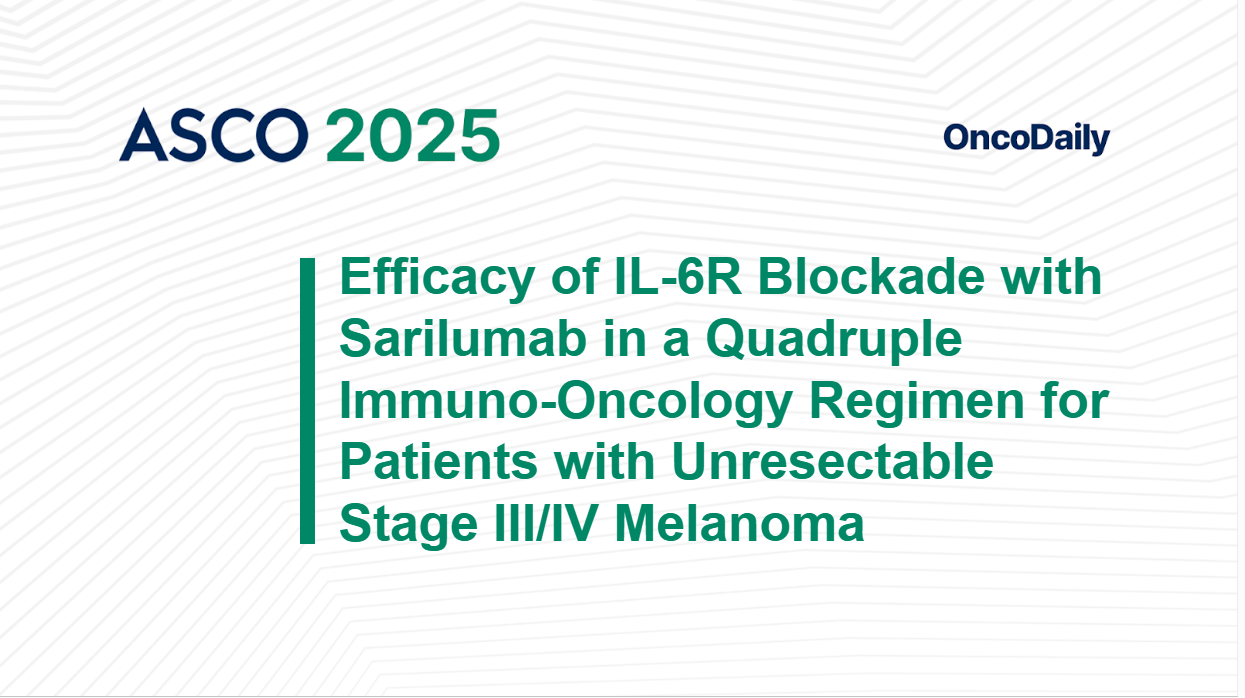The ASCO Annual Meeting 2025 is happening from May 30 to June 3 in Chicago. It’s the top global meeting for cancer doctors, researchers, and industry experts. They all come together at McCormick Place to share new discoveries, discuss latest cancer treatments, and plan what’s next for cancer care. You can expect to hear about important clinical trial results, exciting new research, and ideas to make patient care better and fairer.
What Is the Sarilumab (Sari) Combination Trial?
This was a single-arm, phase II clinical trial investigating a novel quadruplet immunotherapy regimen for patients with unresectable stage III or stage IV melanoma. The trial combined the IL-6 receptor (IL-6R) blocking antibody sarilumab (Sari) with the immune checkpoint inhibitors nivolumab (Nivo, anti-PD-1), relatlimab (Rela, anti-LAG-3), and ipilimumab (Ipi, anti-CTLA-4). The rationale for including Sari was to potentially reduce the high rates of immune-related adverse events (irAEs) often seen with combination checkpoint inhibitor regimens, particularly those incorporating anti-CTLA-4 blockade, as IL-6 is a key cytokine in inflammatory responses.
Trial Endpoints and Translational Aims
The study had co-primary endpoints:
- To evaluate the rate of Grade 3-5 irAEs.
- To assess antitumor activity, defined by the RECIST best overall response rate (BORR) at 24 weeks.
With a sample size of 33 patients, the trial was powered to detect a significant reduction of at least 22% from the known irAE rate of Nivo, Rela, and Ipi combinations. Secondary analyses included estimating BORR with a 95% confidence interval, and measuring circulating IL-6 signaling mediators over time in a subset of patients to understand the biological impact of Sari. The translational aim was to demonstrate that targeting the IL-6 pathway could mitigate immunotherapy-induced toxicity without compromising the robust antitumor efficacy of combined checkpoint blockade, offering a safer and more tolerable treatment option for advanced melanoma.
Read More ASCO 2025 Updates on OncoDaily’s Website
Sarilumab Combination Trial Results
A total of 33 patients (40% female, 60% male, median age 63, ECOG PS 0-1) were treated in the trial. The patient cohort included those with various disease characteristics, such as 3% with acral and 9% with mucosal melanoma, 24% with >M1c disease, and 39% with elevated LDH. BRAF status was known for 81% of patients, with 26% being BRAF-positive. The median follow-up for these patients was 9.8 months as of the December 12, 2024 data lock. Median treatment duration was 28 weeks, with only 9% of patients discontinuing therapy due to toxicity.
Efficacy Outcomes
The combination therapy demonstrated encouraging antitumor activity. The best overall response rate (BORR) at 24 weeks was 63.6% (95% CI: 45.1%, 79.6%), indicating a substantial proportion of patients experiencing tumor shrinkage or disappearance. Median progression-free survival (PFS) and overall survival (OS) were not reached, suggesting durable disease control, with the 25th percentile for PFS being 8.3 months. These efficacy results compare favorably with other published combination regimens that include CTLA-4 blockade.
Safety Profile
The study observed a notable reduction in severe irAEs, supporting the hypothesis that IL-6R blockade could improve tolerability. At 24 weeks, only 12.1% (n = 4) of patients experienced Grade ≥3/4 irAEs. This was significantly lower than the expected known irAE rate for this triple checkpoint inhibitor combination (2-sided p = 0.0007, 95% CI: 12.1%-28.2%). Over the entire study duration, 27% (n = 9) had Grade 3/4 toxicity, and 93.9% (n = 31) experienced any grade irAE.
Only two patients had Grade 4 toxicity, and no Grade 5 (fatal) events were reported. Furthermore, translational analyses in 14 patients showed that circulating IL-6Ra and the inflammatory marker IL-4 were significantly reduced at Cycle 2, suggesting a biological impact of sarilumab on inflammatory pathways. These findings indicate that the Nivo, Rela, Ipi, and Sari combination offers an improved tolerability profile while maintaining strong efficacy in advanced melanoma. An ongoing randomized cohort will further clarify the precise impact of IL-6R blockade on clinical outcomes.
You can watch more on OncoDaily Youtube TV
Written By Aren Karapetyan, MD


